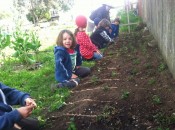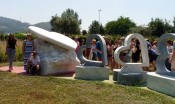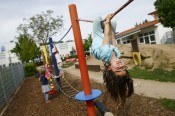 Space speaks. Its language is movement.
Space speaks. Its language is movement. Flexible preparation for your new grade
Flexible preparation for your new grade Waldorf Training in Australia
Waldorf Training in Australia Summer Programs - Culminating Class Trips
Summer Programs - Culminating Class Trips Apply Today: New Cohort Starts Nov. 2025
Apply Today: New Cohort Starts Nov. 2025 Transforming Voices Worldwide
Transforming Voices Worldwide Train to Teach in Seattle
Train to Teach in Seattle Association for a Healing Education
Association for a Healing Education Immersive Academics and Arts
Immersive Academics and Arts Roadmap to Literacy Books & Courses
Roadmap to Literacy Books & Courses Quality Education in the Heartland
Quality Education in the Heartland
 ~ Ensoul Your World With Color ~
~ Ensoul Your World With Color ~ Caring for All Stages of Life
Caring for All Stages of Life Great books for Waldorf Teachers & Families
Great books for Waldorf Teachers & Families Jamie York Books, Resources, Workshops
Jamie York Books, Resources, Workshops Bringing Love to Learning for a Lifetime
Bringing Love to Learning for a Lifetime Waldorf-inspired Homeschool Curriculum
Waldorf-inspired Homeschool Curriculum Everything a Teacher Needs
Everything a Teacher Needs The Journey is Everything
The Journey is Everything Middle School Science With Roberto Trostli
Middle School Science With Roberto Trostli Full-Time Teacher Education
Full-Time Teacher Education Bay Area Teacher Training
Bay Area Teacher Training
Would you like to become a sponsor?
Waldorf News

Nation’s first K-8 urban farm school teaches kids how to grow their own food
June 10, 2016
Children are the future of humanity – so if we want to cultivate a sustainable society where people are connected to our food and the land, it is critical to raise a generation of children who understand how to be good stewards of the earth. That’s why we’re very excited about this innovative urban farm school being built in San Francisco, California that will educate preschoolers through 8th graders with an ecology farm curriculum based on Waldorf Education. Project architect Stanley Saitowitz of Natoma Architects just unveiled plans for a stunning new plant-covered “living building” for the site that will house classrooms and act as a gathering space for the community at the farm. More »

9 Elephants in the (Class)Room That Should “Unsettle” Us
May 31, 2016
At a recent morning workshop for school leaders at a fairly small New England public school district, about an hour into a conversation focused on what they believed about how kids learn best, an assistant superintendent somewhat surprisingly said aloud what many in the room were no doubt feeling. “When I really try to square what I believe about how kids learn and what we practice in our classrooms, it unsettles me,” she said. “And it frustrates me.” As it should. One of the things I’ve come to realize in my many discussions with educators from around the globe is that there are a number of practices in our current systems of schooling that “unsettle” us, primarily because they don’t comport with what Seymour Papert calls our “stock of intuitive, empathic, common sense knowledge about learning.” But what’s also notable about those practices is that we rarely want to discuss them aloud, content instead to let them hover silently in the background of our work. We know, as I suggested a few weeks ago, that in many cases, these practices are attempting to do “the wrong thing right” rather than “do the right thing” in the first place. But we carry on regardless. More »

Waldorf Student Wins International Sculpture Contest
May 23, 2016
I wanted to thank you for posting the Routes of Sculpture Italian sculpture contest announcement article last fall. I found it an exciting prospect and offered entering it as a choice to my class of Embossing students in January. Only one student chose to enter the contest. She is a senior and it took a lot of focus and commitment for her to decide to add an extra task in the final semester of Waldorf high school, just before her senior project presentation was due. She is brave that way. We worked together, going through the application process, the production of the relief sculpture, the artist's statement, and all the requirements for entering the contest. My student took time during her spring break to get everything done on top of all the other obligations of her senior year. All that hard work paid off as the artwork made it into the finals! We were very excited! What an honor to be in the finals. More »

Stanford study finds improved self-regulation in kindergartners who wait a year to enroll
May 18, 2016
A new study on the mental health effects of kindergarten enrollment ages found strong evidence that a one-year delay dramatically improves a child’s self-regulation abilities even into later childhood. According to the study co-authored by Stanford Graduate School of Education Professor Thomas Dee, children who started kindergarten a year later showed significantly lower levels of inattention and hyperactivity, which are jointly considered a key indicator of self regulation. The beneficial result was found to persist even at age 11. “We found that delaying kindergarten for one year reduced inattention and hyperactivity by 73 percent for an average child at age 11,” Dee said, “and it virtually eliminated the probability that an average child at that age would have an ‘abnormal,’ or higher-than-normal rating for the inattentive-hyperactive behavioral measure.” Findings from the study, which Dee co-authored with Hans Henrik Sievertsen of the Danish National Centre for Social Research, could help parents in the recurring debate over the pros and cons of a later school entry. More »
Memories grown in a Waldorf school garden
May 16, 2016
Nine-year-olds wielding scythes working side by side in a wheat field. Third-graders harnessed eight at a time to a wooden plow, like oxen. Grade-schoolers making sachets of dried blood to ward off deer, and burying animal horns in the earth to feed the soil. These are some of the memories my daughters have of their time as students at the Waldorf School of Princeton. My daughters are now in their 30s, and since their school days the number and popularity of school gardens have exploded. The National Farm to School Network reports that 40,000 schools in the United States now have a school garden, where they facilitate learning everything from basic math skills to nutrition. Without question, the gardening program at the Waldorf School of Princeton—and, indeed, at Waldorf schools worldwide—is one of the most intensive, and I’m grateful my children got to participate in it. If my daughters and their classmates are any example, lessons learned in a school garden can create a lasting impression. My daughter Alice still can’t shake the experience of making those god-awful-smelling little sachets to tie onto the fence to keep deer out of the garden. Her sister Elizabeth was convinced, as a third-grader, that she was involved in witchcraft. “We concocted a biodynamic potion, stuffed it into some type of animal horn and buried it underground,” Elizabeth says. “After a moon cycle we took it out and used it to fertilize something.” (Not only have such biodynamic processes gained wider acceptance in recent years, especially in wine grape viticulture, but scientific studies have also found that biodynamic agriculture results in less-stressed soils and marked improvements in diversity of soil microflora and fauna.) It’s quite possible that Elizabeth’s concern about the dark arts may have been further aroused when later the class made their own brooms after cutting down broom corn from the school garden. More »
 Recent Jobs
Recent Jobs
View more jobs »
 Newsletter Archive
Newsletter Archive
 Join the Mailing List!
Join the Mailing List!
Stay Connected…
Each week receive the Waldorf News Weekly Update, full of news, events, and more. Keep abreast of what's happening with Waldorf education.
 RSS Feeds
RSS Feeds